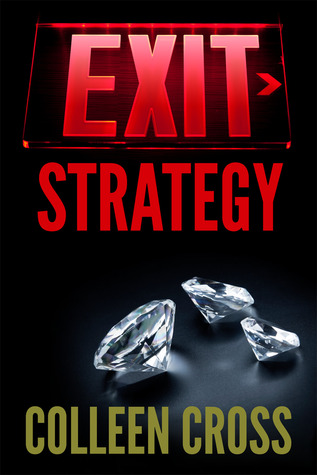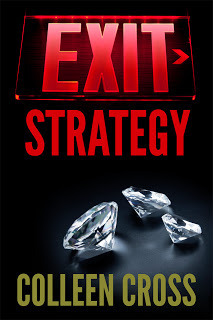Colleen Cross's Blog, page 8
April 20, 2012
Crime Writer Spotlight - Sharon Rowse
Deceptions, lies and shades of grey
are overarching themes for Sharon Rowse, this month's Crime Writer Spotlight author. Sharon's Klondike Mystery series is set in the 1890's and provides a fascinating glimpse of history from a crime writer's perspective.
Without further ado, here's Sharon!
I’ve been thinking about deceptions and lies, and how they interweave throughout my novels, while I watch the grey rainclouds scud by outside my study window. You know, it had never occurred to me before how much I might be influenced by the weather. Living in Vancouver, I'm very familiar with every tint and layer of grey - we Vancouverites live with all of them from November through April. And as a writer - and sometime artist - I love all those changeable greys. Most of the time, anyway.
 There's something wonderful about writing in my study when it’s pouring out, with the cat curled up on the desk beside me and a steaming cup of coffee at hand, writing myself out of the latest corner I’ve painted myself into. Or again in the spring when the trees are greening and the air is soft, but it's just grey enough that being inside writing feels like a treat instead of a punishment.
There's something wonderful about writing in my study when it’s pouring out, with the cat curled up on the desk beside me and a steaming cup of coffee at hand, writing myself out of the latest corner I’ve painted myself into. Or again in the spring when the trees are greening and the air is soft, but it's just grey enough that being inside writing feels like a treat instead of a punishment.
I also love writing the subtle texturing and shadings of gray that bring my characters and their time to life. All my characters seem to have layer on layer of interwoven motive and motivation, and few of them, or the situations they find themselves in, are who or what they seem at first glance. Everyone lies - even the trustworthy Emily Turner, when she has to - some more effectively and more cleverly than others.
Of course, for my Klondike Era Vancouver series - The Silk Train Murder and The Lost Mine Murders - some of this duality is attributable to time and place. Vancouver in 1899 was an interesting mix of rough frontier and progressive city complete with electric lights, telephones, a popular Opera House and a thriving business sector. Attitudes were still very Victorian, particularly towards women, and social mores were constricting. It’s an era where so much was changing so quickly that personal standards were often in conflict with societal ones, creating a vacuum where deception and fraud could thrive.

Granville's friend Sam Scott is lying by omission in order to stay true to his own values, and that lie may mean Scott's death for a murder he didn’t commit. George Gipson, who conned miners out of their claims in the Klondike and has no scruples at all, has set up in Vancouver as a respectable businessman. Granville is determined to expose him as a fraud, if Gipson doesn't manage to have him killed first.
Emily, the independent-minded youngest daughter of a very Victorian father, has a strong sense of fair play, but she resorts to subterfuge and white lies in her quest to aid Granville in avoiding Gipson's traps and clearing Scott's name. In an inflexible culture, Emily is trying to carve out a role for herself that still meets her moral code.
In The Lost Mine Murders, Granville has finally found his place, and a new role for himself as a PI. Emily is struggling to become a typist, and trying not to admit to herself that she loathes it. She leaps at the opportunity to assist Granville with his case once again, even if it takes a white lie or two to get out of class. But the book revolves around deception on a grand scale, as Granville and Emily race to find the legendary Lost Mine and then uncover who really owns it before the next ambush proves fatal.
And in book three? Ah, that would be telling. Suffice it to say that Granville takes on a case where he must find the missing heir to an English earldom, who has vanished into the Canadian wilderness after perpetrating what appears to be a massive real estate fraud on some very unforgiving types. Emily, of course, gets drawn into helping him.
Each of the characters operates within their own shades of grey, and sorting out the interactions and confusion this creates is, for me, one of the pleasures of being an author. So I guess this means I have to stop complaining about the lack of sunshine lately …
Sharon Rowse is fulfilling a lifelong dream in publishing two mystery series set in Vancouver. The Arthur Ellis-nominated The Silk Train Murder, set in 1899, captures the romance of the silk trains that raced across North America. Death of a Secret features artist-turned investigator Barbara O’Grady in a twisting tale of old secrets, lies and treachery. Also available are: The Lost Mine Murders, Death of a Threat and Death of a Lover.
Without further ado, here's Sharon!
I’ve been thinking about deceptions and lies, and how they interweave throughout my novels, while I watch the grey rainclouds scud by outside my study window. You know, it had never occurred to me before how much I might be influenced by the weather. Living in Vancouver, I'm very familiar with every tint and layer of grey - we Vancouverites live with all of them from November through April. And as a writer - and sometime artist - I love all those changeable greys. Most of the time, anyway.
 There's something wonderful about writing in my study when it’s pouring out, with the cat curled up on the desk beside me and a steaming cup of coffee at hand, writing myself out of the latest corner I’ve painted myself into. Or again in the spring when the trees are greening and the air is soft, but it's just grey enough that being inside writing feels like a treat instead of a punishment.
There's something wonderful about writing in my study when it’s pouring out, with the cat curled up on the desk beside me and a steaming cup of coffee at hand, writing myself out of the latest corner I’ve painted myself into. Or again in the spring when the trees are greening and the air is soft, but it's just grey enough that being inside writing feels like a treat instead of a punishment.I also love writing the subtle texturing and shadings of gray that bring my characters and their time to life. All my characters seem to have layer on layer of interwoven motive and motivation, and few of them, or the situations they find themselves in, are who or what they seem at first glance. Everyone lies - even the trustworthy Emily Turner, when she has to - some more effectively and more cleverly than others.
Of course, for my Klondike Era Vancouver series - The Silk Train Murder and The Lost Mine Murders - some of this duality is attributable to time and place. Vancouver in 1899 was an interesting mix of rough frontier and progressive city complete with electric lights, telephones, a popular Opera House and a thriving business sector. Attitudes were still very Victorian, particularly towards women, and social mores were constricting. It’s an era where so much was changing so quickly that personal standards were often in conflict with societal ones, creating a vacuum where deception and fraud could thrive.

Granville's friend Sam Scott is lying by omission in order to stay true to his own values, and that lie may mean Scott's death for a murder he didn’t commit. George Gipson, who conned miners out of their claims in the Klondike and has no scruples at all, has set up in Vancouver as a respectable businessman. Granville is determined to expose him as a fraud, if Gipson doesn't manage to have him killed first.
Emily, the independent-minded youngest daughter of a very Victorian father, has a strong sense of fair play, but she resorts to subterfuge and white lies in her quest to aid Granville in avoiding Gipson's traps and clearing Scott's name. In an inflexible culture, Emily is trying to carve out a role for herself that still meets her moral code.
In The Lost Mine Murders, Granville has finally found his place, and a new role for himself as a PI. Emily is struggling to become a typist, and trying not to admit to herself that she loathes it. She leaps at the opportunity to assist Granville with his case once again, even if it takes a white lie or two to get out of class. But the book revolves around deception on a grand scale, as Granville and Emily race to find the legendary Lost Mine and then uncover who really owns it before the next ambush proves fatal.
And in book three? Ah, that would be telling. Suffice it to say that Granville takes on a case where he must find the missing heir to an English earldom, who has vanished into the Canadian wilderness after perpetrating what appears to be a massive real estate fraud on some very unforgiving types. Emily, of course, gets drawn into helping him.
Each of the characters operates within their own shades of grey, and sorting out the interactions and confusion this creates is, for me, one of the pleasures of being an author. So I guess this means I have to stop complaining about the lack of sunshine lately …
Sharon Rowse is fulfilling a lifelong dream in publishing two mystery series set in Vancouver. The Arthur Ellis-nominated The Silk Train Murder, set in 1899, captures the romance of the silk trains that raced across North America. Death of a Secret features artist-turned investigator Barbara O’Grady in a twisting tale of old secrets, lies and treachery. Also available are: The Lost Mine Murders, Death of a Threat and Death of a Lover.
Published on April 20, 2012 05:00
April 17, 2012
Corruption
 Fraud and corruption often go hand in hand. Transparency International publishes a Corruption Perception Index. This index shows the perceived corruption in the public sector by country. Actual levels may differ. Some think it may be much higher. The results may also be impacted by differences in what people consider corruption.
Fraud and corruption often go hand in hand. Transparency International publishes a Corruption Perception Index. This index shows the perceived corruption in the public sector by country. Actual levels may differ. Some think it may be much higher. The results may also be impacted by differences in what people consider corruption. Transparency International defines corruption as the abuse of entrusted power for private gain. Two-thirds of the countries scored less than 5.0 on a scale of 1.0 to 10.0.
Transparency International defines corruption as the abuse of entrusted power for private gain. Two-thirds of the countries scored less than 5.0 on a scale of 1.0 to 10.0.Many developing countries do not have the infrastructure or political systems in place to counteract these types of activities. However, conflicts of interest abound in more affluent countries as well. Lobby groups can and do influence lawmakers, and money and power can be powerful motivators.
The best way to counteract this is transparency in government and business. A code of ethics is also valuable to ensure clarity on what is acceptable and what is not.
View the results here. How did your country fare?
Published on April 17, 2012 05:00
April 14, 2012
McBarge + McDonalds = McHappy

I'm sooo excited! I've just learned that my favorite floating restaurant is about to be resurrected! If you've read my book, Exit Strategy, you'll be familiar with the McBarge. Back in the days of Vancouver's Expo '86 World's Fair, it housed a floating McDonalds restaurant. The McBarge is also one of the settings for Exit Strategy.
What happens on the McBarge? You'll have to read Exit Strategy to find out. All I can say is that Kat gets more than she bargained for.
Why is the McBarge moving? The current owner has approval to re-open it as a floating restaurant in Mission, B.C. Right now it is moored in Burrard Inlet, in Burnaby, a Vancouver suburb. It has sat there for decades, and it will be nice to see it in use again.
Relocating it to Mission means that it will likely be towed out to sea, where it will follow the coast to the mouth of the Fraser River. Then it will head up the river to Mission, which is about an hour's drive from Vancouver.
I live near the Fraser River in Greater Vancouver, and I'll be watching and waiting for the McBarge to float by. I have fond memories of Expo '86, and my visits there always included a trip to the McBarge for a Filet-O-Fish and a milkshake. I'll be the first in line when the McBarge arrives at its new home in Mission on the Fraser River. I'd like a window seat and the fish 'n chips, please.
Published on April 14, 2012 06:00
April 10, 2012
Lit Fest New West - New Westminster
I'm very excited to be part of the second annual Lit Fest New West this weekend in New Westminster, B.C. This event celebrates the literary arts, writers, authors. It is also a venue for the Lower Mainland leg of the BC Book Prizes Tour.
The reading and writing festival starts on Thursday, April 12th. Check out all the exciting events:
Thursday, April 12, 2012: The Heritage Grill hosts the Dead Poet's Slam. A poetry slam is a competition where poets read or recite original work, but at a Dead Poet's Slam, poets read a dead poet's poetry. Sometimes they dress in costume to resemble the dead poet. Performances will be judged by five randomly selected members of the audience. It could be you! You might even discover the next Canadian Poetry Idol! $5 at the door.
Friday, April 13, 2012: The New Westminster Public Library hosts a Night of Mystery. On Friday the 13th, no less! I will be with fellow authors Don Hauka and Elizabeth Elwood. We'll be reading short excerpts from our work and will answer your questions on mystery and crime writing, our books. A reception will follow. Free.
Saturday, April 14, 2012: Douglas College is the venue for a variety of workshops, a marketplace and entertainment. If you are an aspiring writer, bring a sample of your work and visit the Blue Pencil Cafe for a free review by published authors and poets. All events free.
There's something for everyone. Looking forward to seeing you there!


The reading and writing festival starts on Thursday, April 12th. Check out all the exciting events:
Thursday, April 12, 2012: The Heritage Grill hosts the Dead Poet's Slam. A poetry slam is a competition where poets read or recite original work, but at a Dead Poet's Slam, poets read a dead poet's poetry. Sometimes they dress in costume to resemble the dead poet. Performances will be judged by five randomly selected members of the audience. It could be you! You might even discover the next Canadian Poetry Idol! $5 at the door.
Friday, April 13, 2012: The New Westminster Public Library hosts a Night of Mystery. On Friday the 13th, no less! I will be with fellow authors Don Hauka and Elizabeth Elwood. We'll be reading short excerpts from our work and will answer your questions on mystery and crime writing, our books. A reception will follow. Free.
Saturday, April 14, 2012: Douglas College is the venue for a variety of workshops, a marketplace and entertainment. If you are an aspiring writer, bring a sample of your work and visit the Blue Pencil Cafe for a free review by published authors and poets. All events free.
There's something for everyone. Looking forward to seeing you there!

Published on April 10, 2012 05:00
April 7, 2012
Look for Horses, Not Zebras
 "When you hear hoof beats, don't think zebras" is an old saying first applied in the medical field when making diagnoses.
"When you hear hoof beats, don't think zebras" is an old saying first applied in the medical field when making diagnoses.It's based on the principle that horses are much more common than zebras (at least where I live), and therefore more likely.
It can also be applied to forensic accounting which uncovers fraud, or to any other crime.
While the crime may be complex, the fraudster's motivations are always simple: self-interest. That core need could be the money itself, a sense of entitlement, or a need to appear important and powerful.
In other words, rule out the obvious first.
There are many technological tools at our disposal to solve a crime, but focusing on the end result (in the criminal's eyes), can also uncover the fraudster, or at least narrow down the field. Technology and analysis provide the evidence to back it up.

Published on April 07, 2012 13:18
April 3, 2012
Conflict Diamonds - Alive and Well
Conflict diamonds are what originally sparked my idea for Exit Strategy in 2003. I had read an excellent report written by Global Witness titled For a Few Dollars More. The report detailed how al Qaeda moved into the diamond trade, using diamonds as a means to launder their funds.
 While Exit Strategy is not specifically about Al Qaeda, it touches on the same theme of using diamonds to finance terrorist and organized crime activity. Global Witness has documented evidence of Al Qaeda's involvement in the conflict diamond trade since the 1990's, starting in Kenya and Tanzania, and then moving to Sierra Leone and Liberia. Hezbollah and similar organizations also use diamonds as a way to launder funds, particularly after 9/11.
While Exit Strategy is not specifically about Al Qaeda, it touches on the same theme of using diamonds to finance terrorist and organized crime activity. Global Witness has documented evidence of Al Qaeda's involvement in the conflict diamond trade since the 1990's, starting in Kenya and Tanzania, and then moving to Sierra Leone and Liberia. Hezbollah and similar organizations also use diamonds as a way to launder funds, particularly after 9/11.
Whether the commodity is diamonds or some other store of value, the theme is the same. A few rich and powerful people or organizations exploit a country, stripping its resources for their benefit, at the expense of the general population.
The Kimberly Process Certification Scheme was created in 2002 to counteract this exploitation, which is essentially diamond laundering. Global Witness was co-nominated for a Nobel Peace Prize in 2003 for its work on conflict diamonds.
Sadly, in late 2011, Global Witness withdrew its backing from the Kimberly Process, citing ongoing corruption and lack of accountability by governments and the diamond trade. Zimbabwe, a country known for corruption and human rights issues, was allowed to export diamonds under the Kimberly Process, despite corruption and the military's deep involvement in Zimbabwe's diamond trade, at the expense of the general population.
Whether timber in Cambodia (Khmer Rouge), Ivory Coast (cocoa), or Nigeria (oil), natural resources are prime targets for crime and corruption. What's ironic is that some of the wealthiest countries (in terms of natural resouces) have the lowest standards of living globally for 95% of their population.
In fact, you could argue that the vast majority of the population in these countries would have a safer, more affluent existence if these resources were less abundant. That's a pretty sad statement. Five percent of their population exploits that much from the remaining ninety-five percent.
It can happen in your country too. I'll talk more about this in future posts.

 While Exit Strategy is not specifically about Al Qaeda, it touches on the same theme of using diamonds to finance terrorist and organized crime activity. Global Witness has documented evidence of Al Qaeda's involvement in the conflict diamond trade since the 1990's, starting in Kenya and Tanzania, and then moving to Sierra Leone and Liberia. Hezbollah and similar organizations also use diamonds as a way to launder funds, particularly after 9/11.
While Exit Strategy is not specifically about Al Qaeda, it touches on the same theme of using diamonds to finance terrorist and organized crime activity. Global Witness has documented evidence of Al Qaeda's involvement in the conflict diamond trade since the 1990's, starting in Kenya and Tanzania, and then moving to Sierra Leone and Liberia. Hezbollah and similar organizations also use diamonds as a way to launder funds, particularly after 9/11.Whether the commodity is diamonds or some other store of value, the theme is the same. A few rich and powerful people or organizations exploit a country, stripping its resources for their benefit, at the expense of the general population.
The Kimberly Process Certification Scheme was created in 2002 to counteract this exploitation, which is essentially diamond laundering. Global Witness was co-nominated for a Nobel Peace Prize in 2003 for its work on conflict diamonds.
Sadly, in late 2011, Global Witness withdrew its backing from the Kimberly Process, citing ongoing corruption and lack of accountability by governments and the diamond trade. Zimbabwe, a country known for corruption and human rights issues, was allowed to export diamonds under the Kimberly Process, despite corruption and the military's deep involvement in Zimbabwe's diamond trade, at the expense of the general population.
Whether timber in Cambodia (Khmer Rouge), Ivory Coast (cocoa), or Nigeria (oil), natural resources are prime targets for crime and corruption. What's ironic is that some of the wealthiest countries (in terms of natural resouces) have the lowest standards of living globally for 95% of their population.
In fact, you could argue that the vast majority of the population in these countries would have a safer, more affluent existence if these resources were less abundant. That's a pretty sad statement. Five percent of their population exploits that much from the remaining ninety-five percent.
It can happen in your country too. I'll talk more about this in future posts.
Published on April 03, 2012 09:00
March 31, 2012
Exit Strategy Book Giveaway
I'm giving away a copy of Exit Strategy on Goodreads.com. Why not enter? Follow the link below. Or, if you don't want to wait until the contest closes on April 2nd, you can also find it on Amazon and all other book sellers. Good luck!
Goodreads Book Giveaway Exit Strategy by Colleen Cross Giveaway ends April 02, 2012.
Exit Strategy by Colleen Cross Giveaway ends April 02, 2012.
See the giveaway details at Goodreads. Enter to win


Goodreads Book Giveaway
 Exit Strategy by Colleen Cross Giveaway ends April 02, 2012.
Exit Strategy by Colleen Cross Giveaway ends April 02, 2012. See the giveaway details at Goodreads. Enter to win

Published on March 31, 2012 04:30
March 27, 2012
Interview on ACL Blog
I'm currently featured on ACL's Business Assurance Blog. Forensic accountants like Kat Carter use analytics software to detect fraud and assess internal controls.
Follow the link below to see the interview in which I talk about Exit Strategy and what inspired me to write it.

ACL Services Ltd. is the leading global provider of audit analytics and continuous monitoring software to the audit and controls professions and the financial management community.
Link to ACL Blog and Colleen Cross Interview
You can get Exit Strategy here, or at any online or offline retailer:

Follow the link below to see the interview in which I talk about Exit Strategy and what inspired me to write it.

ACL Services Ltd. is the leading global provider of audit analytics and continuous monitoring software to the audit and controls professions and the financial management community.
Link to ACL Blog and Colleen Cross Interview
You can get Exit Strategy here, or at any online or offline retailer:
Published on March 27, 2012 18:05
March 21, 2012
Scams Targeting Seniors
There have been a number of stories in the news recently about seniors targeted by fraudsters.
The ruse is an old one: they get a phone call from a grandchild, saying they are in trouble. The story may vary, but the end result is the same. John or Sue is in trouble, and they are too afraid or ashamed to go to their parents. But they need money, either to pay a lawyer, post bail, or replace a lost plane ticket.
Maybe you have received a telephone call like this before, or know someone who has. How is it that a stranger knows so much information about you or your loved ones? The answer: they don't.
 People give away a lot of information in general conversation without realizing it. For instance, a grandparent may inadvertently give out the name of a grandchild in conversation. Alternatively, the perpetrator may give a name, but say they are calling on behalf of the grandchild, who is in trouble. Like most scams, the idea is to prompt for information, then create a sense of urgency to distract the victim from the suspicious nature of the call. The senior or other vulnerable person is then duped and cheated out of their money, just because they wanted to help someone in need.
People give away a lot of information in general conversation without realizing it. For instance, a grandparent may inadvertently give out the name of a grandchild in conversation. Alternatively, the perpetrator may give a name, but say they are calling on behalf of the grandchild, who is in trouble. Like most scams, the idea is to prompt for information, then create a sense of urgency to distract the victim from the suspicious nature of the call. The senior or other vulnerable person is then duped and cheated out of their money, just because they wanted to help someone in need.
Residents of an assisted living residence were targeted recently. Using the scam above, a senior was not only cheated out of her life savings, but also out of pocket for a loan she took out to help her "grandson". The bank did question the senior about the withdrawal, but they were powerless to stop her. After all, it was her money. Privacy laws also prevent banks from disclosing a person's financial information to others. Not only did the senior lose her money, but she now has monthly loan payments she cannot afford to make.
Typically these crimes involve a panicked phone call, then moving the money by Western Union, a courier, or another method not easily traceable. It likely goes to an address out of town. It will be impossible to call them back for some reason, such as being in jail, the hospital, etc. They may start with relatively small amounts and then repeat the ruse, each time with a new complication to the story and another fictitious expense.
There are some common safeguards you can follow to safeguard against this and similar frauds:
Beware of unsolicited phone calls in general. Rather than trusting the identity of the person on the other end, be suspicious until proven otherwise.Never let anyone rush you into action. Scam artists rely on fear and distraction to make their ruse work. A legitimate request would likely have alternatives to this rushed time frame.Ideally, confirm the story with a family member or friend first. If it really is your grandson or granddaughter, you should be able to call them back on their phone number to verify. Do not give out any personal information. Often these people will "fish" for information, and then feed it back to you without you realizing you volunteered it in the first place.Call the police. Most often you are just one of many being targeted in the scam.
Above all, trust your instincts. If something doesn't sound right, there is probably a good reason. It's never too late to ask questions or report a suspicion. Don't feel ashamed or embarrassed. This can happen to anyone. You will very likely prevent another person from being victimized.
Read more about fraud and forensic accounting at http://colleencross.com
Colleen is the author of Exit Strategy, a Katerina Carter fraud thriller available at Amazon.com here or Amazon.co.uk here.

The ruse is an old one: they get a phone call from a grandchild, saying they are in trouble. The story may vary, but the end result is the same. John or Sue is in trouble, and they are too afraid or ashamed to go to their parents. But they need money, either to pay a lawyer, post bail, or replace a lost plane ticket.
Maybe you have received a telephone call like this before, or know someone who has. How is it that a stranger knows so much information about you or your loved ones? The answer: they don't.
 People give away a lot of information in general conversation without realizing it. For instance, a grandparent may inadvertently give out the name of a grandchild in conversation. Alternatively, the perpetrator may give a name, but say they are calling on behalf of the grandchild, who is in trouble. Like most scams, the idea is to prompt for information, then create a sense of urgency to distract the victim from the suspicious nature of the call. The senior or other vulnerable person is then duped and cheated out of their money, just because they wanted to help someone in need.
People give away a lot of information in general conversation without realizing it. For instance, a grandparent may inadvertently give out the name of a grandchild in conversation. Alternatively, the perpetrator may give a name, but say they are calling on behalf of the grandchild, who is in trouble. Like most scams, the idea is to prompt for information, then create a sense of urgency to distract the victim from the suspicious nature of the call. The senior or other vulnerable person is then duped and cheated out of their money, just because they wanted to help someone in need.Residents of an assisted living residence were targeted recently. Using the scam above, a senior was not only cheated out of her life savings, but also out of pocket for a loan she took out to help her "grandson". The bank did question the senior about the withdrawal, but they were powerless to stop her. After all, it was her money. Privacy laws also prevent banks from disclosing a person's financial information to others. Not only did the senior lose her money, but she now has monthly loan payments she cannot afford to make.
Typically these crimes involve a panicked phone call, then moving the money by Western Union, a courier, or another method not easily traceable. It likely goes to an address out of town. It will be impossible to call them back for some reason, such as being in jail, the hospital, etc. They may start with relatively small amounts and then repeat the ruse, each time with a new complication to the story and another fictitious expense.
There are some common safeguards you can follow to safeguard against this and similar frauds:
Beware of unsolicited phone calls in general. Rather than trusting the identity of the person on the other end, be suspicious until proven otherwise.Never let anyone rush you into action. Scam artists rely on fear and distraction to make their ruse work. A legitimate request would likely have alternatives to this rushed time frame.Ideally, confirm the story with a family member or friend first. If it really is your grandson or granddaughter, you should be able to call them back on their phone number to verify. Do not give out any personal information. Often these people will "fish" for information, and then feed it back to you without you realizing you volunteered it in the first place.Call the police. Most often you are just one of many being targeted in the scam.

Above all, trust your instincts. If something doesn't sound right, there is probably a good reason. It's never too late to ask questions or report a suspicion. Don't feel ashamed or embarrassed. This can happen to anyone. You will very likely prevent another person from being victimized.
Read more about fraud and forensic accounting at http://colleencross.com
Colleen is the author of Exit Strategy, a Katerina Carter fraud thriller available at Amazon.com here or Amazon.co.uk here.
Published on March 21, 2012 20:54
March 15, 2012
Crime Writer Spotlight - Leanne Dyck
Today we're in for a treat! My guest this week is Crime Writer Leanne Dyck. She shares some juicy flash fiction. It's about deception of a different kind.
A Necessary Deception
Hespoke to her, touched her. A cool hand of longing traced down her body and madeher shiver.
Why doI feel like this? What'swrong with me? This iswrong. I should stop. She knew she wouldn't; she knew shecouldn't. She was his. He possessed her.
Shelonged to stroke his cheek, kiss his lips, melt in his embrace.
 So there she sat upon her bed—alonewith him. Her nose buried in the book.
So there she sat upon her bed—alonewith him. Her nose buried in the book. She turned each page in eageranticipation. Her imagination was a world they shared. To her he lived,breathed. She'd found him in the school library. The book was tattered. Howmany years had he waited for her? She shuttered to think. It wasn't important.What mattered was that she had found him.
She longed for their life togetherto continue. She turned the pages very slowly, savouring each word.
She'd excused herself immediatelyafter breakfast. "I have to make my bed and fix my hair," she'd told hergrandparents, pushing back her chair. She hadn't lied. Those tasks neededtending to; but what she'd wanted was to spend more time with him.
Mygrandma would never understand. How could she possibly? She's way too old. And she thinksI'm a good girl—their darling angelic granddaughter. They don't know me.They only know the shadow illusions in which I hide.
In Leanne's thriller, The Sweater Curse, aspiring knitwear designer Gwen Bjarnson is stuck in Purgatory.To escape, she must re-examine her life, journey through her past and right a wrong. But which wrong?
Young and in love, she works to establish her career, except fate has different plans. One rash act and she loses everything. Never resting, always seeking, and yearning for what she can no longer have, Gwen faces the truth: if she remains, others are destined to die. How will she solve the mystery before it is too late?
Leanne is the author of The Sweater Curse and Maynely A Mystery. She is a member of the Crime Writers of Canada. Find out more about Leanne and her books on her website and blog, or buy her books on Amazon:
Web site: www.leannedyck.comBlog: http://sweatercursed.blogspot.com
Published on March 15, 2012 04:00



